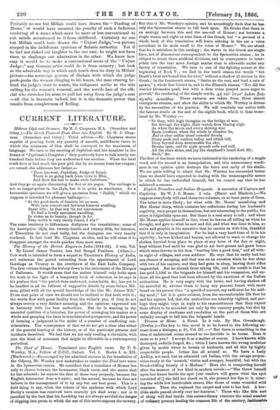The Iliad of Homer. Translated into English verse. By P.
S. Worsley, MA., Fellow of C.C.C., Oxford. VoL L Books I. to XII. (Blackwood.)—Encouraged by his admitted success in the translation of the Odyssey, Mr. Worsley now undertakes to render the Iliad into verse in the Spenserian stanza. He considers that a translator of Homer has only to choose between the hexameter, blank verse, and the metro that ho has selected; he rejects the first of these very properly, because the English hexameter does not exist ; and the second, because he does not believe in the management of it by any but our best poets. This is a bold thing to say, when the echoes of the applause with which Lord Derby's version was received have scarcely yet died away ; nor is it justified by the fact that his Lordship has not always avoided the danger of slipping into prose to which the use of this metre exposes the unwary. But this is Mr. Worsley's opinion, and he accordingly finds that he hen only the Spenserian stanza to fall back upon. He thinks that there is an analogy between this and the sea-roll of Homer ; not between a single stanza and eight or nine lines of the Greek, but " a perusal of a whole book of this translation will leave echoing in the ear a voice accordant in its main swell to the voice of Homer." We are afraid that he is mistaken in this analogy ; the waves in the Greek are single lines, not of dimensions correspondent to the Spenserian stanza ; he is obliged to create these artificial divisions, and in consequence to inter- polate into the text more foreign matter than is allowable under any- theory of translation. We tarn to one of the fighting scenes at the
beginning of Book V. ; we find in the tenth stanza the words " but- Death's fatal net homed him for ever," without a shadow of excuse in the
Greek ; in the fourteenth stanza, "Smite ye the rest, and hurl a rain of spears," a whole line foisted in, and in the fifteenth stanza, "Nor did the warrior Diomedes quail, but with a firm voice prayed more eager to prevail," the rendering of the simple words, Ai roe ;Tip? hparo &yang 0lothiggs.. These extracts are taken from three almost contiguous stanzas, and show the shifts to which Mr. Worsley is driven
by the necessities of his position. We will conclude our notice with- the famous simile at the end of the eighth book, which is thus trans- lated by Mr. Worsley :— " So they, with high thoughts on the bridge of war, Sat through the night, their watch-fires blazing nigh.
As when the moon and every shining star Beam loveliest, when the winds in slumber lie, A'nd in clear outline stand revealed thereby Sharp peak and sunken valley and rifted hill, Deep beyond deep unutterable the sky,
Breaks open, and the night spreads calm and still,
All the stars shine, and joy the shepherd's heart doth fill ; • Such," &c.
The first of the lines which we have italicized is the rendering of a single• word, and the second is an interpolation, and this unnecessary wordi- ness in our opinion quite destroys the force and unity of the simile.- We are quite willing to admit that Mr. Worsley has succeeded better than we should have expected in dealing with the unmanageable metre in which he has enthralled himself, but we cannot say that he has- achieved a success.






























 Previous page
Previous page